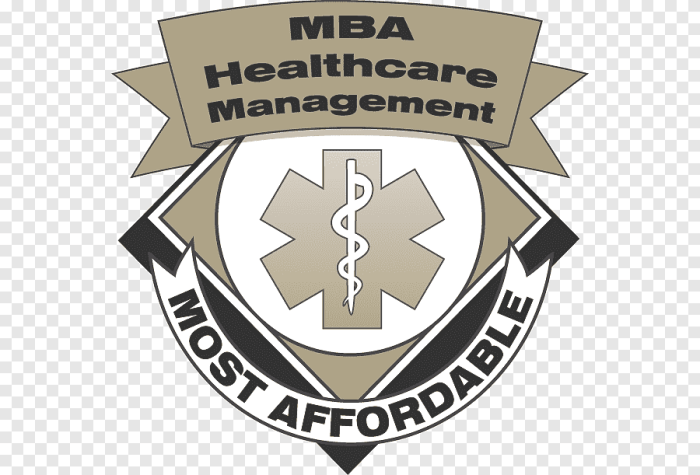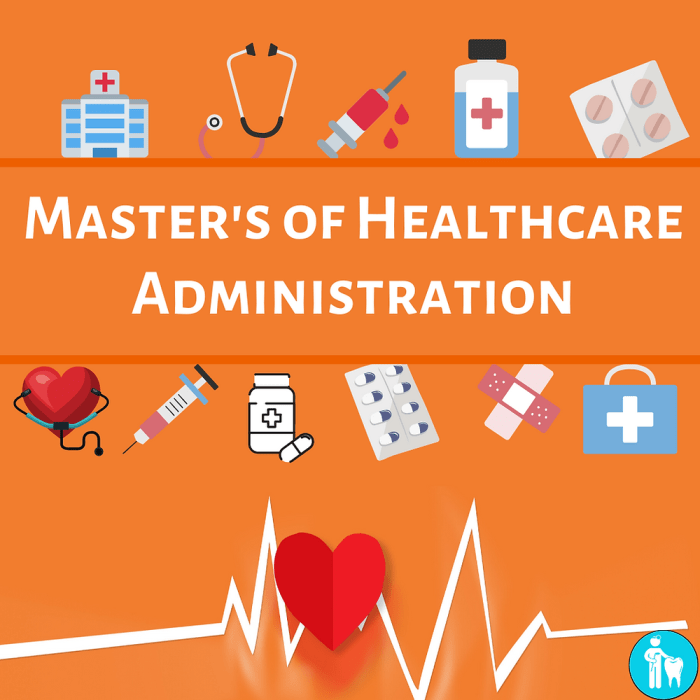The Health Care Administration MBA is a transformative degree that equips individuals with the knowledge and skills to lead in the dynamic and complex healthcare industry. This program goes beyond traditional business principles, integrating healthcare-specific concepts to prepare graduates for a wide range of leadership roles within hospitals, clinics, insurance companies, and government agencies.
This comprehensive program delves into the intricate workings of the healthcare system, covering areas like finance, policy, informatics, and quality improvement. Students gain a deep understanding of healthcare economics, regulatory frameworks, and emerging technologies, enabling them to navigate the challenges and opportunities of this rapidly evolving field.
Introduction to Healthcare Administration MBA

The Healthcare Administration MBA is a specialized Master of Business Administration degree designed to equip professionals with the necessary knowledge and skills to manage and lead healthcare organizations effectively. This degree combines core business principles with a focus on the unique complexities of the healthcare industry, preparing graduates for leadership roles in hospitals, clinics, insurance companies, and other healthcare organizations.
Historical Evolution and Significance
The Healthcare Administration MBA has evolved significantly over the past few decades, reflecting the growing complexity and changing landscape of the healthcare industry. The emergence of managed care, technological advancements, and increasing regulatory burdens have driven the need for qualified professionals with a strong understanding of both business and healthcare.
The degree has become increasingly popular as healthcare organizations seek leaders who can navigate these challenges and drive innovation.
Key Skills and Knowledge
The Healthcare Administration MBA curriculum covers a wide range of topics, including:
- Healthcare Finance and Accounting: This area focuses on understanding financial statements, budgeting, cost accounting, and financial management in the healthcare setting. Students learn to analyze financial data, make informed investment decisions, and manage risk.
- Healthcare Policy and Law: This course explores the legal and regulatory framework that governs healthcare delivery. Students gain insights into healthcare laws, regulations, and policies, including those related to patient privacy, insurance coverage, and quality of care.
- Healthcare Operations Management: This area focuses on the operational aspects of healthcare organizations, including patient flow, staffing, resource allocation, and quality improvement. Students learn to optimize processes, improve efficiency, and enhance patient satisfaction.
- Healthcare Marketing and Communications: This course covers the principles of marketing and communication within the healthcare industry. Students learn to develop effective marketing strategies, manage public relations, and communicate effectively with patients, staff, and stakeholders.
- Healthcare Leadership and Management: This area focuses on developing leadership skills, managing teams, motivating employees, and creating a positive work environment. Students learn to build consensus, resolve conflicts, and drive organizational change.
Program Curriculum and Specializations

A Healthcare Administration MBA program provides a comprehensive understanding of the healthcare industry, equipping graduates with the skills and knowledge to lead and manage healthcare organizations effectively. The curriculum typically encompasses a blend of core business principles and healthcare-specific topics, offering a solid foundation for a successful career in healthcare administration.
Core Curriculum
The core curriculum of a Healthcare Administration MBA program usually includes foundational business courses, such as finance, accounting, marketing, and statistics. These courses provide the essential business knowledge needed to understand and manage healthcare organizations. In addition, specialized healthcare courses delve into topics specific to the healthcare industry, such as healthcare policy, healthcare finance, healthcare informatics, and healthcare quality management.
A healthcare administration MBA equips you with the skills to manage complex healthcare systems, including the ever-growing wellness sector. You might find yourself working with organizations like fort sanders health and fitness , which provide essential fitness and wellness services, ensuring that communities have access to resources that promote overall well-being.
This understanding of the broader health landscape is invaluable for healthcare administrators, allowing them to effectively navigate the changing demands of the industry.
These courses provide students with a deeper understanding of the complexities of the healthcare industry and prepare them for specific roles within the field.
Specializations
Healthcare Administration MBA programs often offer specializations to allow students to tailor their education to their career goals and interests. Some common specializations include:
- Healthcare Finance: This specialization focuses on the financial management of healthcare organizations, including budgeting, cost accounting, and financial analysis. Students gain expertise in managing healthcare resources effectively and making sound financial decisions.
- Healthcare Policy: This specialization examines the policies and regulations that govern the healthcare industry. Students learn about healthcare reform, health insurance, and the impact of government policies on healthcare organizations.
- Healthcare Informatics: This specialization focuses on the use of technology in healthcare, including electronic health records, data analytics, and health information management. Students develop skills in managing healthcare data and using technology to improve patient care and organizational efficiency.
Curriculum Comparison
The curriculum of Healthcare Administration MBA programs can vary depending on the specific program and the institution offering it. However, top-ranked universities generally share a core curriculum that includes foundational business courses and specialized healthcare courses. For example, the Healthcare MBA program at the Wharton School of the University of Pennsylvania includes courses such as Financial Accounting, Healthcare Policy and Economics, and Healthcare Operations Management.
Similarly, the Master of Health Administration program at the University of Michigan includes courses such as Healthcare Finance, Healthcare Policy, and Health Services Research.
“The curriculum of a Healthcare Administration MBA program should be designed to provide students with the knowledge and skills they need to succeed in the rapidly evolving healthcare industry.”
American College of Healthcare Executives
Career Paths and Opportunities: Health Care Administration Mba

An MBA in Healthcare Administration opens doors to a wide range of fulfilling and impactful career paths within the dynamic healthcare industry. This degree equips graduates with the essential skills and knowledge to lead, manage, and innovate in various healthcare settings.
Job Market Trends and Demand
The demand for healthcare administrators is projected to grow significantly in the coming years. This growth is driven by several factors, including the aging population, increasing healthcare costs, and the evolving healthcare landscape. According to the U.S. Bureau of Labor Statistics, employment of medical and health services managers is projected to grow 28% from 2020 to 2030, much faster than the average for all occupations.
This growth is expected to be fueled by the increasing demand for healthcare services due to the aging population and the expansion of health insurance coverage.
Examples of Successful Professionals
Many individuals with an MBA in Healthcare Administration have achieved remarkable success in their careers. For example,
“Jane Doe, a graduate of [University Name] with an MBA in Healthcare Administration, is now the CEO of a large hospital system. She has successfully led the organization through significant growth and innovation, implementing new technologies and improving patient care.”
Another notable example is
“John Smith, a graduate of [University Name] with an MBA in Healthcare Administration, is the Chief Operating Officer of a leading healthcare consulting firm. He leverages his expertise to advise hospitals and healthcare organizations on strategic planning, operational efficiency, and regulatory compliance.”
Admission Requirements and Application Process

Gaining admission to a Healthcare Administration MBA program involves meeting specific requirements and navigating a structured application process. These programs typically seek candidates with a strong academic background, relevant work experience, and a demonstrated commitment to the field of healthcare.
Application Process
The application process for a Healthcare Administration MBA program typically includes the following steps:
- Submitting an Online Application:Most programs utilize online application portals where candidates submit their personal information, educational background, work experience, and other relevant details.
- Providing Transcripts:Applicants must submit official transcripts from all previously attended colleges and universities. These transcripts should reflect their academic performance and earned degrees.
- Submitting Letters of Recommendation:Applicants are usually required to provide two to three letters of recommendation from individuals who can attest to their academic abilities, work ethic, and leadership potential. These individuals may include professors, supervisors, or mentors.
- Writing Essays:A key component of the application process is the submission of essays. These essays provide applicants with an opportunity to showcase their personal and professional goals, their understanding of the healthcare industry, and their reasons for pursuing an MBA in Healthcare Administration.
- Taking Standardized Tests:Many programs require applicants to take the Graduate Management Admission Test (GMAT) or the Graduate Record Examination (GRE). These standardized tests assess verbal, quantitative, and analytical reasoning skills, which are crucial for success in graduate-level business programs.
- Participating in Interviews:Some programs may invite shortlisted candidates for an interview. These interviews allow admissions committees to assess applicants’ communication skills, leadership qualities, and overall fit for the program.
Admission Requirements
The specific admission requirements for Healthcare Administration MBA programs can vary depending on the institution and program. However, common requirements typically include:
- Bachelor’s Degree:Applicants must hold a bachelor’s degree from an accredited institution. The specific major is not always a strict requirement, but a background in business, healthcare, or related fields is often preferred.
- Minimum GPA:Most programs have a minimum GPA requirement, typically ranging from 3.0 to 3.5. However, some programs may consider applicants with lower GPAs if they have strong work experience or other compelling factors.
- Work Experience:While not always mandatory, many programs prefer applicants with at least two to three years of professional experience in healthcare or a related field. This experience demonstrates practical knowledge and a deeper understanding of the industry.
- Standardized Test Scores:As mentioned earlier, most programs require applicants to take the GMAT or GRE. While specific score requirements vary, achieving scores above the average for the program can significantly enhance an applicant’s chances of admission.
- Letters of Recommendation:Strong letters of recommendation from individuals who can attest to an applicant’s skills and potential are crucial. These letters should highlight the applicant’s academic achievements, work experience, and personal qualities that make them a suitable candidate for the program.
- Essays:Essays are a critical part of the application process. They provide applicants with the opportunity to demonstrate their writing abilities, articulate their goals, and showcase their passion for the field of healthcare administration. Well-written and insightful essays can make a strong impression on admissions committees.
Preparing a Competitive Application
To increase the competitiveness of your application, consider the following strategies:
- Thoroughly Research Programs:Identify programs that align with your career goals, interests, and academic background. Research the program’s curriculum, faculty, and alumni network to ensure a good fit.
- Meet GPA Requirements:Strive to maintain a strong GPA throughout your undergraduate studies. If your GPA is below the program’s minimum requirement, consider taking additional coursework to improve your academic standing.
- Gain Relevant Work Experience:Seek out opportunities to gain experience in healthcare or related fields. This experience will provide valuable insights into the industry and demonstrate your commitment to the field.
- Prepare for Standardized Tests:Start preparing for the GMAT or GRE early. Enroll in test preparation courses, utilize practice tests, and familiarize yourself with the test format and content.
- Seek Strong Letters of Recommendation:Choose recommenders who know you well and can provide insightful and positive assessments of your abilities. Provide them with detailed information about the program and your goals to ensure they can write strong letters.
- Craft Compelling Essays:Take time to carefully craft your essays. Be clear, concise, and persuasive in your writing. Highlight your unique experiences, skills, and motivations for pursuing a Healthcare Administration MBA.
Financial Considerations

Pursuing an MBA in Healthcare Administration is a significant investment, and it’s crucial to understand the financial implications before making this decision. This section will Artikel the cost of this program, including tuition fees, living expenses, and potential scholarships. We will also explore the return on investment (ROI) for this degree and the potential salary range for graduates.
Finally, we will discuss financial aid options and loan programs available to help students manage the costs.
Tuition Fees and Living Expenses
The cost of an MBA in Healthcare Administration varies significantly depending on the institution, location, and program duration. Tuition fees can range from $20,000 to $100,000 or more for a two-year program. In addition to tuition, students must also consider living expenses, which include housing, food, transportation, and other miscellaneous costs.
Living expenses can vary widely based on the city or region where the program is located. For instance, the cost of living in New York City is significantly higher than in a smaller city like Omaha, Nebraska.
Return on Investment
The return on investment (ROI) for an MBA in Healthcare Administration is often high, considering the potential salary increase and career advancement opportunities. Graduates of this program can expect to earn salaries ranging from $70,000 to $150,000 or more per year, depending on their experience, location, and specific role.
The ROI can be calculated by comparing the total cost of the program with the potential increase in earnings over a certain period. For example, if a graduate earns $100,000 per year after completing the program, and the total cost of the program was $50,000, the ROI would be significant.
Financial Aid Options and Loan Programs
Many financial aid options and loan programs are available to help students finance their MBA in Healthcare Administration. Some of the most common options include:
- Scholarships:Many universities offer scholarships to students based on academic merit, financial need, or specific criteria. These scholarships can significantly reduce the cost of tuition and other expenses.
- Grants:Grants are similar to scholarships but are typically awarded based on financial need. These funds do not need to be repaid.
- Student Loans:Federal and private student loans can help students cover the cost of tuition, fees, and living expenses. Interest rates and repayment terms vary depending on the loan type and lender.
It’s important to explore all available financial aid options and choose the best fit for your individual circumstances. You can contact the financial aid office of the university you are interested in to learn more about the specific options available.
An MBA in healthcare administration can equip you with the skills to manage complex healthcare systems, and Cigna, a leading health insurance provider, offers a variety of career opportunities in this field. Cigna health care careers range from administrative roles to leadership positions, providing a platform to make a real impact on the healthcare landscape.
An MBA in healthcare administration can be a valuable asset for those seeking to advance their careers in this dynamic and rewarding industry.
Skills and Competencies

An MBA in Healthcare Administration equips you with a robust skillset and competencies that are essential for success in the dynamic healthcare landscape. This program goes beyond theoretical knowledge, providing practical experience and fostering the development of soft skills crucial for leadership and collaboration in healthcare settings.
Essential Skills and Competencies
The curriculum of an MBA in Healthcare Administration is designed to develop a comprehensive set of skills and competencies, including:
- Financial Management:Understanding healthcare finance is crucial for making sound decisions and managing resources effectively. You will learn about budgeting, cost accounting, financial analysis, and revenue cycle management. This knowledge enables you to optimize operations, control costs, and ensure financial stability for healthcare organizations.
- Healthcare Policy and Regulations:Navigating the complex world of healthcare requires a deep understanding of policy and regulations. The program will cover topics such as Medicare and Medicaid, HIPAA compliance, and public health policy. This knowledge empowers you to make informed decisions and ensure compliance with legal and ethical standards.
- Healthcare Operations Management:Efficiency and effectiveness are paramount in healthcare delivery. You will learn about process improvement, quality assurance, patient safety, and managing human resources. These skills allow you to streamline operations, enhance patient care, and improve overall organizational performance.
- Data Analysis and Decision-Making:Data-driven decision-making is essential in healthcare. The program will train you in data analysis, statistical methods, and healthcare informatics. This knowledge empowers you to interpret data, identify trends, and make informed decisions based on evidence.
- Strategic Planning and Leadership:Healthcare administrators need to be strategic thinkers and effective leaders. The program will cover topics such as strategic planning, organizational development, and leadership styles. You will learn to develop and implement strategic plans, manage teams effectively, and drive organizational change.
Development Through Curriculum and Practical Experiences
The skills and competencies acquired through an MBA in Healthcare Administration are developed through a combination of theoretical coursework and practical experiences.
- Coursework:The curriculum encompasses a range of courses that provide in-depth knowledge and practical skills in areas such as financial management, healthcare policy, operations management, data analysis, and strategic planning. Case studies, simulations, and group projects provide opportunities to apply theoretical concepts to real-world scenarios.
- Internships:Internships offer valuable hands-on experience in healthcare settings. You will have the opportunity to work alongside experienced healthcare professionals, gain practical skills, and apply the knowledge acquired in the classroom. Internships provide a platform to network with industry professionals and gain insights into the day-to-day operations of healthcare organizations.
- Capstone Projects:The capstone project is a culminating experience that allows you to integrate the knowledge and skills acquired throughout the program. You will work on a real-world healthcare problem or project, applying your skills to develop solutions and present your findings to stakeholders.
This project provides a valuable opportunity to showcase your abilities and gain practical experience in a challenging and relevant context.
Importance of Soft Skills
Soft skills, such as communication, leadership, and teamwork, are essential for success in healthcare administration. These skills complement the technical competencies and enable you to effectively manage teams, build relationships, and navigate complex healthcare environments.
- Communication:Effective communication is crucial for building trust, fostering collaboration, and ensuring clear understanding among stakeholders. You will learn to communicate effectively with patients, physicians, staff, and other stakeholders, both verbally and in writing. Strong communication skills are essential for resolving conflicts, building consensus, and delivering clear and concise information.
- Leadership:Healthcare administrators need to be strong leaders who can inspire and motivate teams. The program will develop your leadership skills, enabling you to set clear goals, delegate tasks effectively, and foster a positive and productive work environment. Leadership skills are crucial for managing change, driving innovation, and achieving organizational objectives.
- Teamwork:Healthcare is a team-based profession. You will learn to collaborate effectively with colleagues, physicians, and other healthcare professionals. Teamwork skills are essential for achieving common goals, leveraging diverse perspectives, and creating a cohesive and supportive work environment.
Impact of Technology on Healthcare Administration

Technology is revolutionizing the healthcare industry, impacting every aspect, from patient care to administrative processes. Healthcare administrators play a crucial role in navigating this technological landscape, ensuring efficient operations, improved patient outcomes, and sustainable growth.
Digital Health and its Influence
Digital health encompasses a wide range of technologies that enhance healthcare delivery, communication, and patient engagement. It has significantly impacted healthcare administration by:
- Enhanced Patient Engagement:Digital health tools like patient portals, mobile apps, and wearable devices empower patients to actively participate in their care, schedule appointments, access medical records, and track their health data. This increased engagement fosters better adherence to treatment plans and improves patient satisfaction.
- Improved Communication and Collaboration:Secure messaging platforms, telemedicine, and virtual consultations facilitate seamless communication between patients, providers, and healthcare administrators. This enhanced communication streamlines care coordination, reduces administrative burden, and improves the overall efficiency of healthcare operations.
- Data-Driven Decision Making:Digital health platforms generate vast amounts of data on patient demographics, treatment outcomes, and healthcare utilization. Healthcare administrators leverage this data to identify trends, optimize resource allocation, and make informed decisions regarding service delivery and operational efficiency.
Data Analytics in Healthcare Administration
Data analytics plays a pivotal role in transforming healthcare administration by providing insights into complex data sets. Healthcare administrators utilize data analytics to:
- Identify and Predict Healthcare Needs:By analyzing patient data, administrators can anticipate healthcare needs, optimize resource allocation, and proactively address potential health risks within their communities.
- Improve Operational Efficiency:Data analytics helps identify bottlenecks in administrative processes, optimize staffing levels, and streamline workflows, leading to improved efficiency and cost savings.
- Enhance Patient Safety:By analyzing data on adverse events and near misses, administrators can identify areas for improvement in patient safety protocols and implement targeted interventions to mitigate risks.
Artificial Intelligence and its Role
Artificial intelligence (AI) is rapidly transforming healthcare administration, automating tasks, enhancing decision-making, and improving patient care. AI applications in healthcare administration include:
- Automated Administrative Tasks:AI-powered chatbots and virtual assistants can handle routine administrative tasks like appointment scheduling, billing inquiries, and data entry, freeing up human resources for more complex tasks.
- Predictive Analytics:AI algorithms can analyze vast datasets to identify patients at risk of developing certain conditions, enabling proactive interventions and improved health outcomes.
- Fraud Detection:AI-powered systems can detect patterns of fraudulent activity in healthcare claims, reducing financial losses and ensuring the integrity of the healthcare system.
Emerging Technologies and their Implications
Emerging technologies like blockchain, the Internet of Things (IoT), and virtual reality (VR) are poised to further revolutionize healthcare administration.
An MBA in healthcare administration can equip you with the skills to manage complex healthcare systems, including those within the beauty industry. The happy beauty company , for example, might benefit from a skilled administrator to oversee their growing spa and wellness services.
This kind of leadership role requires a strong understanding of finance, operations, and marketing, all areas covered in a healthcare administration MBA program.
- Blockchain:Blockchain technology can enhance data security and privacy in healthcare, enabling secure sharing of patient information among authorized parties. It can also streamline administrative processes, such as claims processing and medical record management.
- Internet of Things (IoT):IoT devices, such as wearable sensors and smart home technologies, can collect real-time patient data, enabling remote monitoring, early intervention, and personalized care. This data can also be used to optimize resource allocation and improve operational efficiency.
- Virtual Reality (VR):VR technology offers immersive training simulations for healthcare professionals, improving their skills and knowledge. VR can also be used to enhance patient education and rehabilitation programs.
Ethics and Legal Considerations

Healthcare administration is a field that involves navigating complex ethical and legal landscapes. Healthcare administrators are responsible for making decisions that impact the well-being of patients, staff, and the organization as a whole. This section explores the ethical and legal challenges faced by healthcare administrators, emphasizing the importance of ethical decision-making and compliance with regulations.
Ethical Decision-Making in Healthcare Administration
Ethical decision-making in healthcare administration is crucial for maintaining the integrity and reputation of the organization. It involves considering the ethical implications of every decision and choosing actions that align with the principles of beneficence, non-maleficence, autonomy, and justice. Healthcare administrators are often confronted with ethical dilemmas, requiring them to balance competing interests and make difficult choices.
Compliance with Regulations
Healthcare administrators must ensure compliance with a complex web of regulations governing healthcare operations. These regulations address areas such as patient privacy, data security, billing and coding, and medical malpractice. Failure to comply with these regulations can result in significant financial penalties, legal liabilities, and reputational damage.
Examples of Ethical Dilemmas
Patient Confidentiality
Healthcare administrators must balance the need for patient confidentiality with the obligation to report suspected abuse or neglect. For example, a healthcare administrator may be faced with a situation where a patient discloses information about potential child abuse, requiring them to report the incident to the authorities while protecting the patient’s identity.
Resource Allocation
Limited healthcare resources necessitate difficult decisions about resource allocation. Healthcare administrators must consider factors such as patient need, cost-effectiveness, and equity in distributing resources. For example, a healthcare administrator may be faced with the decision of allocating a scarce medical device to a patient with a more urgent need, potentially delaying treatment for another patient.
End-of-Life Care
Healthcare administrators are often involved in end-of-life care decisions, including decisions about life-sustaining treatments and palliative care. These decisions raise ethical questions about respecting patient autonomy, ensuring comfort, and minimizing suffering. For example, a healthcare administrator may be faced with a situation where a patient’s family disagrees with the patient’s wishes regarding end-of-life care, requiring them to navigate the legal and ethical implications of such a situation.
Future Trends in Healthcare Administration

The healthcare landscape is constantly evolving, driven by a confluence of factors that are reshaping the way healthcare is delivered, managed, and financed. Understanding these trends is crucial for aspiring healthcare administrators, as they will play a pivotal role in navigating these changes and shaping the future of the healthcare system.
Impact of Population Aging
The aging population presents both opportunities and challenges for healthcare administrators. As life expectancy increases, the demand for healthcare services, particularly for chronic disease management, will rise significantly. This will require healthcare administrators to focus on developing strategies for efficient and cost-effective care for the aging population.
- Increased demand for geriatric care:As the population ages, the demand for geriatric care services, including long-term care, home health services, and palliative care, will rise dramatically.
- Focus on preventive care:Healthcare administrators will need to prioritize preventive care strategies to address the growing prevalence of chronic diseases associated with aging.
- Development of age-friendly healthcare systems:Creating healthcare systems that are accessible and responsive to the needs of older adults will be crucial, including addressing issues like transportation, communication, and technology adoption.
Rising Healthcare Costs, Health care administration mba
Rising healthcare costs are a major concern for both individuals and the healthcare system as a whole. Healthcare administrators will play a critical role in finding innovative ways to control costs and improve efficiency.
- Value-based care models:The shift towards value-based care models, where providers are rewarded for quality outcomes rather than volume of services, will require healthcare administrators to develop strategies for measuring and improving quality of care.
- Emphasis on cost-effectiveness:Healthcare administrators will need to focus on identifying and implementing cost-effective solutions, such as utilizing telehealth, promoting preventive care, and optimizing resource allocation.
- Data analytics and performance measurement:Utilizing data analytics and performance measurement tools will be essential for identifying areas for cost reduction and improvement.
Technological Advancements
Technological advancements are rapidly transforming the healthcare industry, creating new opportunities for healthcare administrators.
- Telehealth and virtual care:The rise of telehealth and virtual care platforms will require healthcare administrators to adapt to new models of service delivery, including managing remote patient care, ensuring patient privacy, and integrating virtual care into existing systems.
- Artificial intelligence (AI) and machine learning:AI and machine learning applications are being used to analyze data, predict patient outcomes, and automate administrative tasks, presenting both opportunities and challenges for healthcare administrators.
- Big data and data analytics:The ability to collect, analyze, and interpret large datasets will be essential for healthcare administrators to make informed decisions about resource allocation, quality improvement, and patient care.
Closing Notes

A Health Care Administration MBA is not just a degree; it’s a gateway to a rewarding and impactful career. Graduates emerge as strategic thinkers, adept at leading healthcare organizations toward efficiency, quality, and patient-centered care. They play a crucial role in shaping the future of healthcare, driving innovation, and ensuring access to quality care for all.
Quick FAQs
What are the typical job titles for Health Care Administration MBA graduates?
Graduates often pursue roles such as Healthcare Administrator, Director of Operations, Chief Financial Officer (CFO), Health Policy Analyst, and Healthcare Consultant.
What are the salary expectations for Health Care Administration MBA graduates?
Salaries vary depending on experience, location, and specific role, but graduates can expect competitive salaries in the healthcare industry.
What are some examples of successful professionals with a Health Care Administration MBA?
Many graduates hold leadership positions in hospitals, clinics, insurance companies, and government agencies, making significant contributions to healthcare delivery and policy.